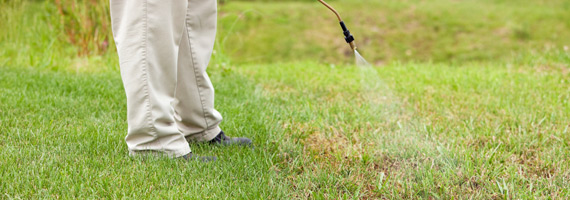With spring now in full swing, it’s a great time to start preparing your lawns for the growing season if you haven’t done so already. If you want a nice lush green lawn for christmas, now is the time to start making it ready.
If you haven’t already, start spraying the bindii, clover and other broad leaf weeds in the lawn. Bindii and clover are rampant in St Clair at the moment and should be taken care of early. It’s not a bad idea to simply pull them out as you see them if you don’t have a huge lawn weed problem. But I would still spray the whole lawn for best effect.

The nights are still cold but the days are warming up and many lawns in St Clair are showing signs strong growth. Most of my lawns are now back on the regular fortnightly mowing cycle.
One thing many people forget is that, like us humans, plants need water in the winter too. They may not need as much as in the warmer months. But if you give your lawns a good deep drink every 10 to 14 days in winter, it will help to minimize the effect of the cold weather and it will come back nicely in spring. Keeping the lawn healthy also helps to minimize weeds such as bindii and clover.
Along with spraying the right selective herbicides, clover can be kept under control to some extent with regular mowing. If allowed to flower, it will spread not only over your lawn but over the whole neighbourhood. In fact most flowering lawn weeds can be managed with a regular mowing schedule. Removing the flowers prevents new plants from propagating.
This time of the year, before the heavy growth sets in, I like to drop the mowing height down a few notches. This helps to remove some of the dead, dry material which essentially suffocates the lawn inhibiting good healthy growth. It also makes it difficult to mow once it it starts to grow. If your lawn is overly “spongy” it needs de-thatching. This can be done with a good strong steel rake. But hiring a de-thatching machine takes a lot of the hard work out of it. Mowing the lawn on a low height setting a couple of times has a similar effect. Be sure to use a catcher though ;). It looks bad initially. However, in the long run your lawn will thank you for it.
Once you have made whatever preparations your lawn needs to get ready for spring, it’s time to start fertilising and watering. Use a good quality slow release fertiliser in early spring and again in early summer. Spread the fertiliser evenly then water in first with a hard hose making sure the fertiliser is pushed down to soil level. Follow this up with a good deep watering with a sprinkler or soaker hose if water restrictions allow. In extremely dry conditions a wetting agent may also be beneficial.
A couple of weeks after fertilising you may also want to topdress your lawn to add vital nutrients back to the soil and promote a thicker and more fertile lawn with may help to inhibit weed growth. Don’t overdo it though. And definitely don’t do it every year or you will end up with a heavily thatched lawn among other problems. Speak to your local nursery or turf supplier for more information.
Keep your lawns well watered throughout the spring and summer. And keep an eye on the lawns and the weather. If it’s particularly hot and dry, or if the lawn starts looking brown and crispy, it needs a good drink. Lawns benefit more from occasional deep watering than more regular shallow watering. If you are watering with a hand hose you will need to stand there for a long period of time for best effect. So make sure you do it outside the hottest times of the day.
Follow these simple spring lawn care steps and you will have a lawn to be proud of. Come back soon for more simple tips to a fair dinkum good lawn.

